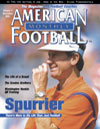AMERICAN FOOTBALL MONTHLY THE #1 RESOURCE FOR FOOTBALL COACHES
Article CategoriesAFM Magazine
|
The Big 1010 tips for getting your next job...© More from this issue Every year thousands of coaches try to take the next step up the ladder of success thatleads to the land of head coaching. Most of these men fully believe they have "what it takes" and all they need is a chance. Yet, many of these same men will tell me they feel totally disenfranchised and do not know how to "get in the loop" or make it to the next level. So many coaches seem to feel if they work hard, their efforts will be noticed and rewarded. My response is: Maybe. But, why should someone interested in moving his career forward leave success to luck or chance their future on the fact that possibly someone will notice their accomplishments? Chance can be minimized by coaches when ....The full article can only be seen by subscribers.
|
|
|||||||
| HOME |
MAGAZINE |
SUBSCRIBE | ONLINE COLUMNISTS | COACHING VIDEOS |
Copyright 2025, AmericanFootballMonthly.com
All Rights Reserved





